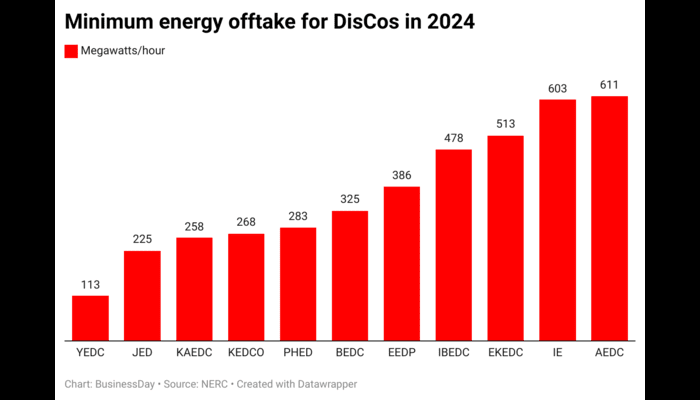Power distribution companies (DisCos) in Nigeria have been given the green light by the regulator to buy electricity directly from producers of the commodity after over 10 years of relying on an intermediary called the bulk trader.
The DisCos and the generation companies (GenCos) unbundled from the defunct Power Holding Company of Nigeria were privatised in 2013 and handed over to the core investors on Nov. 1 of that year, while the Transmission Company of Nigeria (TCN) has remained under government ownership.
The government-owned Nigerian Bulk Electricity Trading Plc (NBET) buys electricity in bulk from generation companies through power purchase agreements and sells through vesting contracts to the DisCos, which then supply it to the consumers. It began trading with commencement of the transactional electricity market in 2015.
The Nigerian Electricity Regulatory Commission (NERC) said in the Multi-Year Tariff Order 2024 that DisCos can now procure electricity directly from GenCos through bilateral contracts. Documents released by NERC showed that the tariff review applications of the 11 power distributions in the country included plans to exit NBET’s vesting contract regime.
The regulator said the new order recognises a revision to the DisCos’ partially contracted capacity (PCC) to ensure a minimum energy offtake with effect from 1st January 2024. The minimum energy offtake requirement for the 11 DisCos this year is 4,063MWh/h.
The DisCos are required “to secure adequate bilateral contracts to facilitate a seamless exit from NBET’s vesting contract regime”, it said.
NERC said that through bilateral contracts, the DisCos are required to mitigate their “exposure to volumetric energy risks”, adding that they would have no recourse to claim revenue shortfall arising from generation shortfalls effective January 2024.
It said the DisCos are also required to continually procure additional energy volumes to serve their customers and ensure steady migration of customers to higher service bands on account of improved level of supply.
Under the service-based tariff arrangement introduced in 2020, customers are categorised into maximum demand and non-maximum demand customers, with different bands (A to E) depending on the level of supply.
Total power generation in the country stood at 4,365.2 megawatts (MW) as of 6:00 am on Thursday, while the generation capacity was 7,652.6MW, according to data from the Nigerian Electricity System Operator.
The regulator said in its latest quarterly report that the partial activation of contract (PAC) regime, which took effect in July 2022, defines “the target volume of energy to be off-taken by DisCos at any time” as their PCC.
Under the PAC regime, DisCos have take-or-pay obligations on their PCC which means that they must pay for available capacity irrespective of their offtake. This structure ensures that GenCos earn capacity payments to compensate them for availability and mandates GenCos or TCN to compensate DisCos through liquidated damages in the event of capacity shortfalls, according to the regulator.
“With the just released 2024 Multi-Year Tariff Order for each Disco, it would appear that Discos are now generally allowed to procure bilateral power from generation companies, directly,” Ayodele Oni, an energy law expert and partner at Bloomfield Law Practice, said. “This is in preparation for the transition of the bulk trader, NBET.”
He said DisCos indebted to the market would be required to enter into payment arrangements with NBET “and invariably the new contracting party, as NBET is anticipated to be dissolved in 2024”.
“Whilst acknowledging the challenges in the market, there is a positive attitude towards the initiative, which would eliminate middlemen, build accountability and allow the GenCos and DisCos and GasCos (gas companies) to trade with each other bilaterally based on their actual capacities on agreed terms including agreeing innovative forms of securitisation,” he said.
***
You can visit us for more news at: thenewsdesk.ng
DisCos To Now Buy Electricity Directly From Producers
